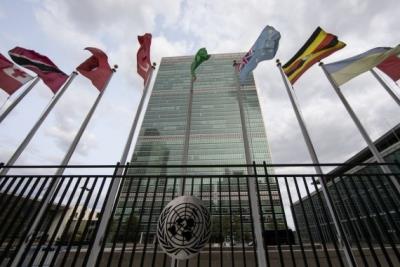
UN body recommends to mitigate negative consequence of corruption, Covid-19
New Delhi, Oct 30 (IANS) With an aim to prevent and combat corruption and recover better despite the unprecedented shocks of Covid-19, the United Nations Office on Drug Control and Crime has published a policy paper to mitigate the negative consequences of corruption and
Covid-19.
According to the policy paper published on Thursday, it has suggested measures taken by member states to prevent and combat corruption and recover better despite the unprecedented shocks of Covid-19.
It is critical for member states to make choices on how to recover better for the future and foster resilience in preparation for future crises.
"Member states have already taken significant steps to integrate and enforce anti-corruption measures across response and recovery plans by engaging all sectors and sections of society.
Sharing these illustrative actions could help support the development, strengthening and enforcement of similar measures by member states, thereby reducing the risks of corruption and increasing the impact of the global response and recovery," the policy paper said.
The UN body has suggested all emergency funds received would be subject to an audit within six months and a publication of findings, including the full text and beneficial ownership information for all procurement contracts.
The specific budget lines could be created to help track and report emergency fund expenditures on a regular basis through a transparent online portal along with rapid processing of whistle-blowing reports related to violations in the implementation of Covid-19 legislation.
It also recommended that the supreme audit institution or similar body could create a Covid-19 health emergency control strategy and use existing knowledge to verify the acquisition and distribution of essential products to vulnerable populations.
The international body pleaded that all grants disbursed from a central fund or related to short-term employment assistance could be required to undergo a retrospective audit to confirm the accuracy of the data submitted by grant beneficiaries.
Suggesting that the Parliament of the member countries could require information from the Ministry of Health or related institution concerning the allocation and distribution of public resources to fight Covid-19, including with respect to the procurement of essential goods and medical equipment, the UN body suggested that a Parliamentary committee could be established to monitor and supervise the implementation of emergency measures through updated information from all relevant authorities, including the Anti-Corruption Commission for monitoring purposes.
Talking about the public procurement of emergency medical supplies and services and pre-registering suppliers, the UN body said institutions could be empowered to quickly check suppliers and procure what they need without concerns about price-gouging or falsified products after the centralized procurement authority sets conditions for procurement and verified suppliers who registered in a publicly available framework agreement.
A help desk by the central purchasing body could be established to enable contracting authorities to consult on emergency procurement procedures, complemented by guidelines, templates for authorizing direct awards if necessary and regularly updated lists of available products and pre-screened suppliers, it added.
The re-sale of masks and other medical equipment and supplies could be prohibited to mitigate incentives for individuals and groups to purchase such goods and sell them at a higher price.
All information concerning crisis-related public procurement and the beneficial owners of companies on contract with the government to respond to Covid-19 should be made publicly available.
Suggesting to fix a maximum price limit, an emergency procurement instruction from the government could detail maximum prices for emergency medical supplies such as personal protective equipment and the government could issue a policy note that encourages contracting authorities to quickly pay suppliers to maintain businesses while also calling on them to make any data, including balance sheets, ledgers and profit and loss accounts, available to contracting authorities to ensure that funds were used as intended.
Proposing for open contracting, the United Nations body said Covid-19 related procurement could be excluded from typical procedures, but all contracts would be required to be reported and published in full within one day of signing.
Civil society organizations would thus be able to track the procurement of essential supplies, checking the price of coronavirus tests to ensure that authorities are spending resources efficiently, it added.
The UN body strongly suggests to use technology and open data to prevent corruption in Covid-19 response and recovery digital platforms to reduce corruption risks while increasing transparency and the corruption risk mapping project operated by the government could engage anti-corruption institutions and local communities to monitor, track and update information concerning potential corruption across the country to ensure the state is aware and can respond appropriately.
Proposing a digital accountability platform, the UN policy paper suggested setting up an accountability platform could provide the general public and state control agencies with data on the management of funds by various state agencies, including general and specific overviews of the disbursement of subsidies, goods and services, and contracting.
--IANS
ams/khz

Legal Disclaimer:
MENAFN provides the
information “as is” without warranty of any kind. We do not accept
any responsibility or liability for the accuracy, content, images,
videos, licenses, completeness, legality, or reliability of the information
contained in this article. If you have any complaints or copyright
issues related to this article, kindly contact the provider above.


















Comments
No comment